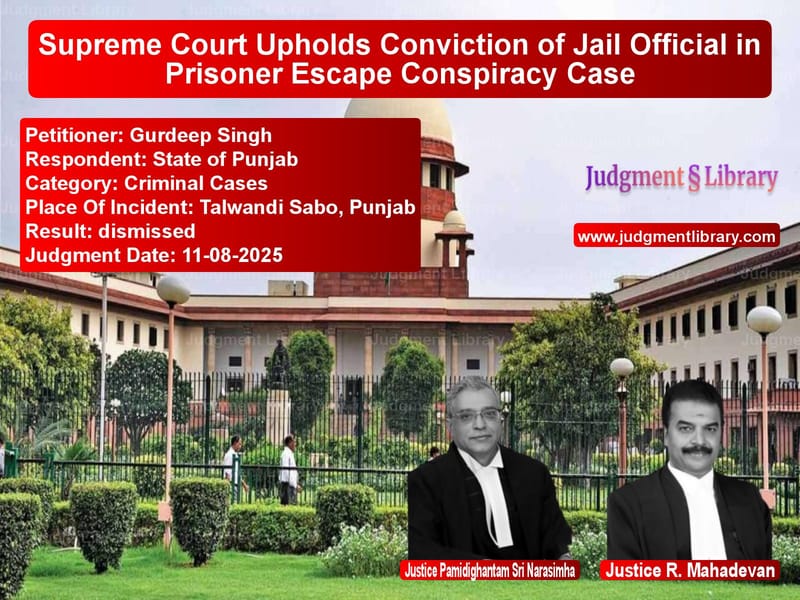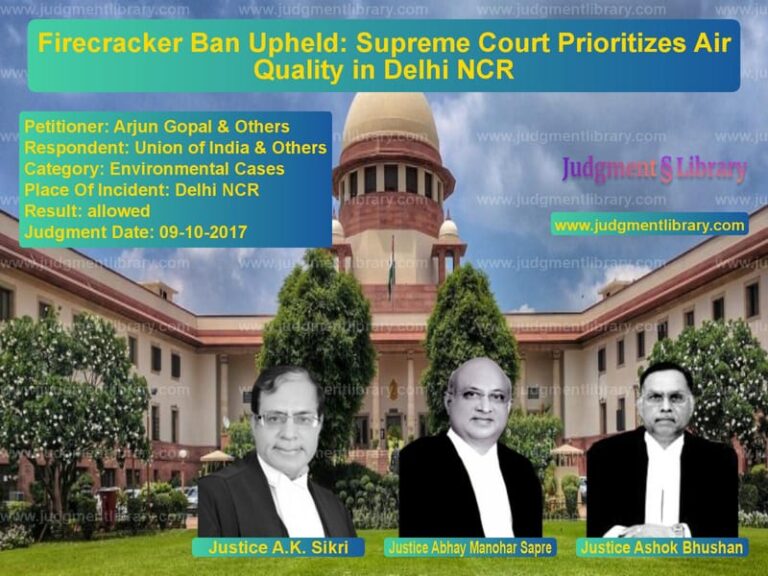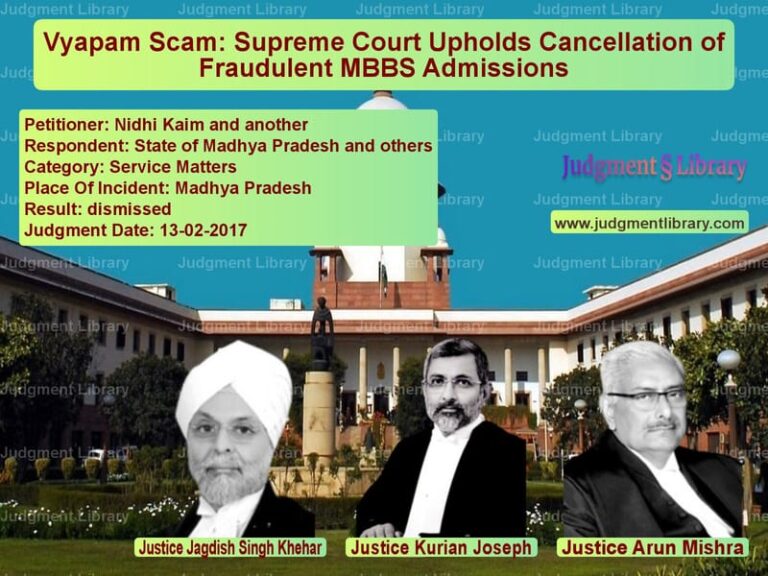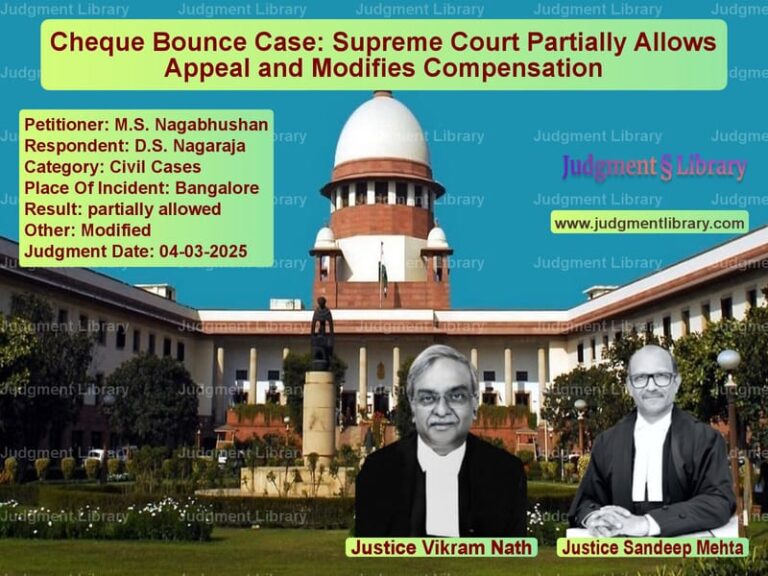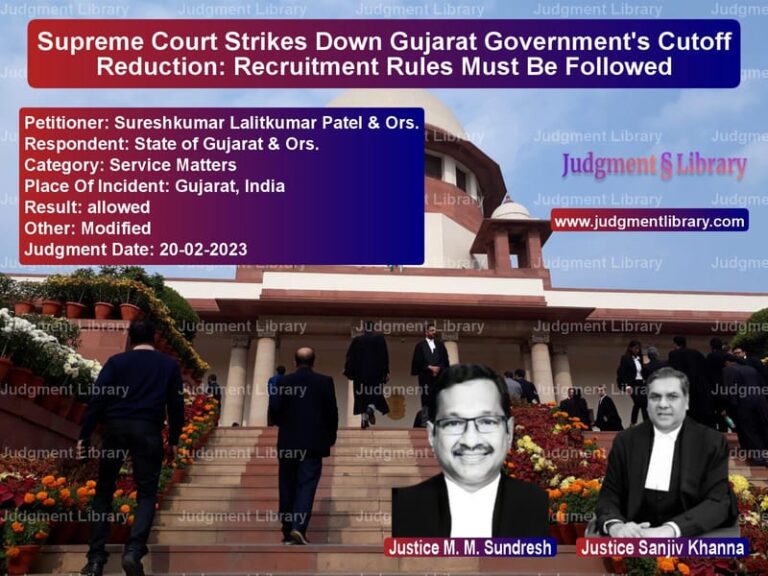Supreme Court Upholds Conviction of Jail Official in Prisoner Escape Conspiracy Case
In a significant ruling that reinforces the accountability of public officials, the Supreme Court has dismissed the appeal of Gurdeep Singh, an Assistant Superintendent of Jail, who was convicted for his involvement in a conspiracy to help an undertrial prisoner escape custody. The judgment, delivered on August 11, 2025, by Justices Pamidighantam Sri Narasimha and R. Mahadevan, upholds the concurrent findings of both the Trial Court and Punjab & Haryana High Court, emphasizing that public servants who betray institutional trust must face the severest consequences.
The case dates back to November 30, 2010, when Head Constables Harjit Singh and Hardial Singh were escorting undertrial prisoner Kuldeep Singh from Ludhiana to Talwandi Sabo for court proceedings. What unfolded that day revealed a carefully orchestrated conspiracy that would eventually implicate a senior jail official in a serious criminal plot.
The Incident and Criminal Conspiracy
The prosecution case revealed that after court proceedings concluded, Gurdeep Singh, who had accompanied the escort party, suggested they return in a private Tata Qualis vehicle instead of the official transport. Despite initial hesitation, the constables agreed based on his assurance. The vehicle already contained two unidentified persons in the rear seat. When the vehicle reached near village Kutiwal, Gurdeep Singh asked the driver to stop, claiming he needed to answer nature’s call. At this moment, the two rear-seat occupants threw red chilli powder into the constables’ eyes and attacked them with weapons – one with a knife and the other with a kirpan.
The assailants attempted to help Kuldeep Singh escape, but he remained secured due to handcuffs and chains. Gurdeep Singh, along with the assailants, fled the scene while the injured constables were taken to Civil Hospital, Rampura. The entire episode was later established to be a premeditated conspiracy to facilitate the prisoner’s escape.
Legal Proceedings and Conviction
Initially, Gurdeep Singh was not named in the FIR, and a preliminary investigation by the Deputy Superintendent of Police had even declared him innocent. However, during the trial, based on emerging evidence, the prosecution filed an application under Section 319 of CrPC, and he was summoned as an additional accused.
The Trial Court convicted Gurdeep Singh under multiple sections including Section 307 (attempt to murder) read with Section 120B (criminal conspiracy) of IPC, along with Sections 225, 186, 332, and 353 of IPC. He was sentenced to rigorous imprisonment ranging from two months to three years for various offences, all sentences to run concurrently. The High Court subsequently affirmed this conviction, leading to the present appeal before the Supreme Court.
Arguments Before the Supreme Court
The appellant’s counsel raised several crucial arguments challenging the conviction. They contended that “the appellant has been falsely implicated without any cogent or reliable evidence connecting him either to the alleged occurrence or to the alleged conspiracy with the co-accused.”
They emphasized that “the entire prosecution case rested solely on the testimony of PW.2, the complainant, who was admittedly an interested witness” and that “no overt act was attributed to the appellant. The sole allegation was that he had suggested to use a particular vehicle for convenience.”
The defense also argued that “there was no reliable, sufficient, or legal evidence to support the charge of criminal conspiracy against the appellant. The case was based purely on conjecture and surmise, rather than proof beyond reasonable doubt.”
In response, the State counsel argued that “the appellant, though an official of the Jail Department, played an active role in facilitating the commission of the offence by deliberately selecting a vehicle that enabled the assailants to launch an assault on the complainant and attempt to free the undertrial prisoner.”
They emphasized that “the overall conduct of the appellant including his failure to act during the violent assault, which involved the use of deadly weapons and red chilli powder, reveals his conscious participation in the criminal conspiracy.”
Supreme Court’s Legal Analysis
The Supreme Court delivered a comprehensive analysis of three key legal issues: the validity of summoning under Section 319 CrPC, the establishment of criminal conspiracy, and the reliability of evidence despite hostile witnesses.
On the issue of summoning under Section 319 CrPC, the Court relied on the landmark Constitution Bench judgment in Hardeep Singh v. State of Punjab, observing that “even a person not named in the FIR or chargesheet can be summoned to face trial if evidence recorded during the course of trial indicates his involvement in the offence. The Court emphasized that the opinion of the investigating agency is merely tentative and cannot override the Court’s independent judicial assessment based on trial evidence.”
Regarding criminal conspiracy under Section 120B IPC, the Court provided extensive legal reasoning, noting that “the offence of criminal conspiracy under section 120B IPC, by its very nature, is seldom capable of being proved by direct evidence. Being a clandestine agreement between two or more persons to commit an unlawful act, or a lawful act by unlawful means, conspiracy is typically established through circumstantial evidence, patterns of conduct, and the cumulative interferences drawn from the interactions of the accused persons.”
The Court further elaborated that “conspiracy is inherently covert and rarely leaves behind direct traces. Its existence can be inferred from the surrounding facts and circumstances, the conduct of the accused before, during, and after the occurrence, and the manner in which the crime unfolds. It was further held that every conspirator need not commit an overt act to be held liable, the agreement itself constitutes the offence.”
On the issue of hostile witnesses, the Court reaffirmed established principles, stating that “the evidence of a prosecution witness is not to be discarded in toto merely because the witness has turned hostile. Courts are entitled to rely upon any portion of such testimony which is found to be credible and corroborated by other evidence on record.”
Court’s Findings and Conclusion
The Supreme Court found overwhelming evidence of Gurdeep Singh’s involvement in the conspiracy. The Court noted that “the prosecution has convincingly established the existence of a prior concert of action between the appellant and the assailants. The use of a private vehicle associated with the appellant, the involvement of unidentified persons, the stop at a scheduled location under a false pretext, and the appellant’s conspicuous inaction during the violent assault – despite being in a position of official authority – all form a continuous chain of incriminating circumstances that point toward his complicity in the conspiracy.”
The Court strongly condemned the appellant’s conduct, stating: “This Court is compelled to express its strongest condemnation of the appellant’s conduct. As a public servant entrusted with safeguarding the rule of law and the custody of prisoners, he did not merely default in his duties – he actively undermined the justice system. When public functionaries betray the institutional trust, the consequences are profound and far-reaching. In a constitutional democracy governed by the rule of law, custodial officers must be held to the highest standards of integrity. Any deviation amounts not only to legal delinquency, but to a grave institutional and moral breach.”
The Court concluded that “the prosecution evidence clearly demonstrates that the attack on the police escort team was not a spontaneous occurrence, but a carefully orchestrated plan. The appellant, holding the post of Assistant Superintendent of Jail, was fully aware of the security protocols applicable to undertrial escorts. Instead of upholding these procedures, he misused his position and familiarity with the escort personnel to subvert the established norms.”
In its final ruling, the Supreme Court dismissed the appeal, directing that “the appellant shall be taken into custody forthwith, to undergo the remaining period of imprisonment as awarded by the trial Court and affirmed by the High Court.” The judgment serves as a powerful reminder that public officials who abuse their positions to undermine the justice system will face the full force of the law.
Petitioner Name: Gurdeep Singh.Respondent Name: State of Punjab.Judgment By: Justice Pamidighantam Sri Narasimha, Justice R. Mahadevan.Place Of Incident: Talwandi Sabo, Punjab.Judgment Date: 11-08-2025.Result: dismissed.
Don’t miss out on the full details! Download the complete judgment in PDF format below and gain valuable insights instantly!
Download Judgment: gurdeep-singh-vs-state-of-punjab-supreme-court-of-india-judgment-dated-11-08-2025.pdf
Directly Download Judgment: Directly download this Judgment
See all petitions in Attempt to Murder Cases
See all petitions in Fraud and Forgery
See all petitions in Extortion and Blackmail
See all petitions in Custodial Deaths and Police Misconduct
See all petitions in Legal Malpractice
See all petitions in Judgment by P.S. Narasimha
See all petitions in Judgment by R. Mahadevan
See all petitions in dismissed
See all petitions in supreme court of India judgments August 2025
See all petitions in 2025 judgments
See all posts in Criminal Cases Category
See all allowed petitions in Criminal Cases Category
See all Dismissed petitions in Criminal Cases Category
See all partially allowed petitions in Criminal Cases Category

